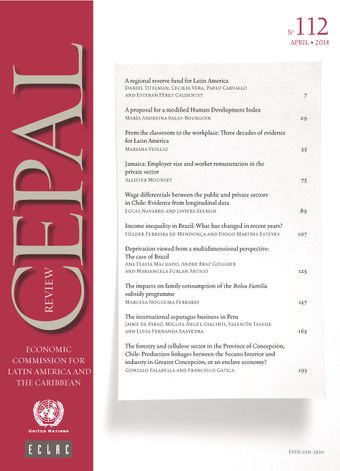-
Income inequality in Brazil: What has changed in recent years?
- Source: CEPAL Review, Volume 2014, Issue 112, Dec 2014, p. 107 - 123
- Spanish
-
- 03 Dec 2014
Abstract
This paper provides empirical evidence to assess the impact of socioeconomic and political variables on different measures of income inequality based on the 27 units of the Brazilian federation in the period from 1999 to 2008. The Brazilian experience is a good example for understanding the income inequality policies in developing countries. The findings suggest that the improvement observed along the period under analysis is a result of the combination of increased trade openness, technological and financial development, a reduction in the unemployment rate, the adoption of social policies that imply a direct effect on the poorest families and the adoption of mechanisms against corruption.
© United Nations





